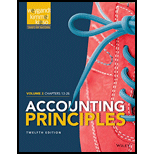
(a)
Financial Statements: The statement prepared for the specific period which comprises the financial information of the organization. It includes a statement of income which shows the profitability of the business, balance sheet which shows the financial position in the terms of assets, liabilities, and capital, and cash flow statement which represents the cash flows for the accounting period.
Earnings per Share (EPS): The part of profit earned by each share of the Company is called as earning per share. It reveals the profitability of the Company. To calculate earnings per share net income is divided by average number of outstanding shares.
Dividend: The amount that shareholders receive in
To determine: The basic earnings per share for both Company A and Company W
(b)
The amount of dividend paid by Company A on December 31, 2013 and Company W on January 31, 2014.
Want to see the full answer?
Check out a sample textbook solution
Chapter 14 Solutions
Accounting Principles, Volume 2: Chapters 13 - 26
- Which of the following errors will cause the trial balance to not balance?A. Omission of a transactionB. Entry posted twiceC. Transposing digits in one sideD. Debiting one account and crediting anotherarrow_forwardMime Delivery Service is owned and operated by Pamela Kolp. The following selected transactionswere completed by Mime Delivery Service during October:1. Received cash from the owner as an additional investment, $7,500.2. Paid creditors on account, $815.3. Billed customers for delivery services on account, $3,250.4. Received cash from customers on account, $1,150.5. Paid cash to the owner for personal use, $500.Required:Indicate the effect of each transaction on the accounting equation elements (Assets, Liabilities,Owner’s Equity, Drawing, Revenue, and Expense) by listing the numbers identifying the transactions,(1) to (5). Also, indicate the specific item within the accounting equation element that is affected, i.e.(1) Asset (Cash) increases by $; Owner’s Equity (Pamela Kolp, Capital) increases by $.arrow_forwardWhen a company incurs an expense but does not yet pay it, what is the entry?A. Debit Expense, Credit CashB. Debit Liability, Credit ExpenseC. Debit Expense, Credit LiabilityD. No entry needed helparrow_forward
- When a company incurs an expense but does not yet pay it, what is the entry?A. Debit Expense, Credit CashB. Debit Liability, Credit ExpenseC. Debit Expense, Credit LiabilityD. No entry neededarrow_forwardDont use ai What is the effect of writing off an uncollectible account under the allowance method?A. Increases net incomeB. No effect on total assetsC. Decreases revenueD. Increases expensesarrow_forwardWhat is the effect of writing off an uncollectible account under the allowance method?A. Increases net incomeB. No effect on total assetsC. Decreases revenueD. Increases expensesi need help ..arrow_forward
- Get the Correct Answer with calculation of this General Accounting Questionarrow_forwardI am trying to find the accurate solution to this general accounting problem with appropriate explanations.arrow_forwardI need help with this general accounting problem using proper accounting guidelines.arrow_forward
- I am looking for the correct answer to this general accounting problem using valid accounting standards.arrow_forwardHello Dear Tutor Please Need Answer of this Question as possible fast and Correctarrow_forward15. The balance in the dividends account is closed to:A. CashB. RevenueC. Retained EarningsD. Common Stock dont use AIarrow_forward

 AccountingAccountingISBN:9781337272094Author:WARREN, Carl S., Reeve, James M., Duchac, Jonathan E.Publisher:Cengage Learning,
AccountingAccountingISBN:9781337272094Author:WARREN, Carl S., Reeve, James M., Duchac, Jonathan E.Publisher:Cengage Learning, Accounting Information SystemsAccountingISBN:9781337619202Author:Hall, James A.Publisher:Cengage Learning,
Accounting Information SystemsAccountingISBN:9781337619202Author:Hall, James A.Publisher:Cengage Learning, Horngren's Cost Accounting: A Managerial Emphasis...AccountingISBN:9780134475585Author:Srikant M. Datar, Madhav V. RajanPublisher:PEARSON
Horngren's Cost Accounting: A Managerial Emphasis...AccountingISBN:9780134475585Author:Srikant M. Datar, Madhav V. RajanPublisher:PEARSON Intermediate AccountingAccountingISBN:9781259722660Author:J. David Spiceland, Mark W. Nelson, Wayne M ThomasPublisher:McGraw-Hill Education
Intermediate AccountingAccountingISBN:9781259722660Author:J. David Spiceland, Mark W. Nelson, Wayne M ThomasPublisher:McGraw-Hill Education Financial and Managerial AccountingAccountingISBN:9781259726705Author:John J Wild, Ken W. Shaw, Barbara Chiappetta Fundamental Accounting PrinciplesPublisher:McGraw-Hill Education
Financial and Managerial AccountingAccountingISBN:9781259726705Author:John J Wild, Ken W. Shaw, Barbara Chiappetta Fundamental Accounting PrinciplesPublisher:McGraw-Hill Education





